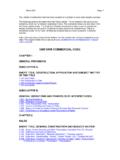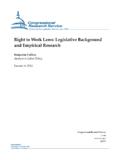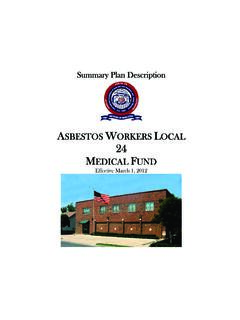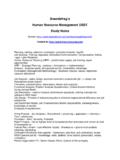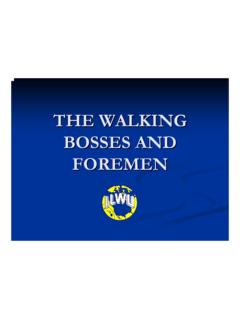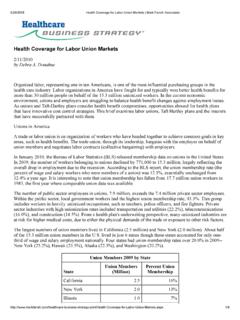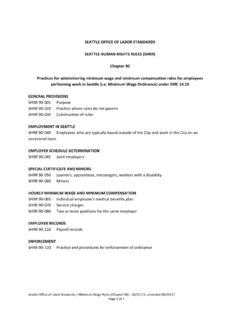Transcription of LABOR-MANAGEMENT RELATIONS ACT - Case File …
1 Page 1 LABOR-MANAGEMENT RELATIONS ACT Pub. L. No. 101, 80th Cong., 1st Sess., 1947, 61 Stat. 136, as amended by Pub. L. No. 257, 86th Cong., 1st Sess., 1959; 29 141-67, 201-97, 29 141-67, 201-97 SHORT TITLE; CONGRESSIONAL DECLARATION OF PURPOSE AND POLICY 1. (a) This chapter may be cited as the " labor management RELATIONS Act, 1947". (b) Industrial strife which interferes with the normal flow of commerce and with the full production of articles and commodities for commerce, can be avoided or substantially minimized if employers, employees, and labor organizations each recognize under law one another's legitimate rights in their RELATIONS with each other, and above all recognize under law that neither party has any right in its RELATIONS with any other to engage in acts or practices which jeopardize the public health, safety, or interest. It is the purpose and policy of this chapter, in order to promote the full flow of commerce, to prescribe the legitimate rights of both employees and employers in their RELATIONS affecting commerce, to provide orderly and peaceful procedures for preventing the interference by either with the legitimate rights of the other, to protect the rights of individual employees in their RELATIONS with labor organizations whose activities affect commerce, to define and proscribe practices on the part of labor and management which affect commerce and are inimical to the general welfare, and to protect the rights of the public in connection with labor disputes affecting commerce.
2 TITLE I. AMENDMENT OF THE NATIONAL labor RELATIONS ACT [The text of the National labor RELATIONS Act was amended. The amendments are shown in bold print in the NLRA file.] TITLE II. CONCILIATION OF labor DISPUTES; NATIONAL EMERGENCIES 201. It is the policy of the United States that (a) sound and stable industrial peace and the advancement of the general welfare, health, and safety of the Nation and of the best interests of employers and employees can most satisfactorily be secured by the settlement of issues between employers and employees through the processes of conference and collective bargaining between employers and the representatives of their employees; (b) the settlement of issues between employers and employees through collective bargaining may be advanced by making available full and adequate governmental facilities for conciliation, mediation, and voluntary arbitration to aid and encourage employers and the representatives of their employees to reach and maintain agreements concerning rates of pay, hours, and working conditions, and to make all reasonable efforts to settle their differences by mutual agreement reached through conferences and collective bargaining or by such methods as may be provided for in any applicable agreement for the settlement of disputes.
3 And (c) certain controversies which arise between parties to collective- bargaining agreements may be avoided or minimized by making available full and adequate governmental facilities Page 2 for furnishing assistance to employers and the representatives of their employees in formulating for inclusion within such agreements provision for adequate notice of any proposed changes in the terms of such agreements, for the final adjustment of grievances or questions regarding the application or interpretation of such agreements, and other provisions designed to prevent the subsequent arising of such controversies. 202. (a) There is created an independent agency to be known as the Federal Mediation and Conciliation Service (herein referred to as the "Service", except that for sixty days after June 23, 1947, such term shall refer to the Conciliation Service of the Department of labor ).
4 The Service shall be under the direction of a Federal Mediation and Conciliation Director (hereinafter referred to as the "Director"), who shall be appointed by the President by and with the advice and consent of the Senate. The Director shall not engage in any other business, vocation, or employment. (b) The Director is authorized, subject to the civil service laws, to appoint such clerical and other personnel as may be necessary for the execution of the functions of the Service, and shall fix their compensation in accordance with chapter 51 and subchapter III of chapter 53 of Title 5, and may, without regard to the provisions of the civil service laws, appoint such conciliators and mediators as may be necessary to carry out the functions of the Service. The Director is authorized to make such expenditures for supplies, facilities, and services as he deems necessary.
5 Such expenditures shall be allowed and paid upon presentation of itemized vouchers therefor approved by the Director or by any employee designated by him for that purpose. (c) The principal office of the Service shall be in the District of Columbia, but the Director may establish regional offices convenient to localities in which labor controversies are likely to arise. The Director may by order, subject to revocation at any time, delegate any authority and discretion conferred upon him by this chapter to any regional director, or other officer or employee of the Service. The Director may establish suitable procedures for cooperation with State and local mediation agencies. The Director shall make an annual report in writing to Congress at the end of the fiscal year. (d) All mediation and conciliation functions of the Secretary of labor or the United States Conciliation Service under section 51 of this title, and all functions of the United States Conciliation Service under any other law are transferred to the Federal Mediation and Conciliation Service, together with the personnel and records of the United States Conciliation Service.
6 Such transfer shall take effect upon the sixtieth day after June 23, 1947. Such transfer shall not affect any proceedings pending before the United States Conciliation Service or any certification, order, rule, or regulation theretofore made by it or by the Secretary of labor . The Director and the Service shall not be subject in any way to the jurisdiction or authority of the Secretary of labor or any official or division of the Department of labor . FUNCTIONS OF SERVICE 203. (a) It shall be the duty of the Service, in order to prevent or minimize interruptions of the free flow of commerce growing out of labor disputes, to assist parties to labor disputes in industries affecting commerce to settle such disputes through conciliation and mediation. (b) The Service may proffer its services in any labor dispute in any industry affecting commerce, either upon its own motion or upon the request of one or more of the parties to the dispute, whenever in its judgment such dispute threatens to cause a substantial interruption of commerce.
7 The Director and the Service are directed to avoid attempting to mediate disputes which would have only a minor effect on interstate commerce if State or other conciliation Page 3 services are available to the parties. Whenever the Service does proffer its services in any dispute, it shall be the duty of the Service promptly to put itself in communication with the parties and to use its best efforts, by mediation and conciliation, to bring them to agreement. (c) If the Director is not able to bring the parties to agreement by conciliation within a reasonable time, he shall seek to induce the parties voluntarily to seek other means of settling the dispute without resort to strike, lock-out, or other coercion, including submission to the employees in the bargaining unit of the employer's last offer of settlement for approval or rejection in a secret ballot.
8 The failure or refusal of either party to agree to any procedure suggested by the Director shall not be deemed a violation of any duty or obligation imposed by this chapter. (d) Final adjustment by a method agreed upon by the parties is declared to be the desirable method for settlement of grievance disputes arising over the application or interpretation of an existing collective-bargaining agreement. The Service is directed to make its conciliation and mediation services available in the settlement of such grievance disputes only as a last resort and in exceptional cases. (e) The Service is authorized and directed to encourage and support the establishment and operation of joint labor management activities conducted by plant, area, and industrywide committees designed to improve labor management relationships, job security and organizational effectiveness, in accordance with the provisions of section 205a of this title.
9 (f) The Service may make its services available to Federal agencies to aid in the resolution of disputes under the provisions of subchapter IV of chapter 5 of Title 5. Functions performed by the Service may include assisting parties to disputes related to administrative programs, training persons in skills and procedures employed in alternative means of dispute resolution, and furnishing officers and employees of the Service to act as neutrals. Only officers and employees who are qualified in accordance with section 573 of Title 5 may be assigned to act as neutrals. The Service shall consult with the agency designated by, or the interagency committee designated or established by, the President under section 573 of Title 5 in maintaining rosters of neutrals and arbitrators, and to adopt such procedures and rules as are necessary to carry out the services authorized in this subsection.
10 204. (a) In order to prevent or minimize interruptions of the free flow of commerce growing out of labor disputes, employers and employees and their representatives, in any industry affecting commerce, shall (1) exert every reasonable effort to make and maintain agreements concerning rates of pay, hours, and working conditions, including provision for adequate notice of any proposed change in the terms of such agreements; (2) whenever a dispute arises over the terms or application of a collective- bargaining agreement and a conference is requested by a party or prospective party thereto, arrange promptly for such a conference to be held and endeavor in such conference to settle such dispute expeditiously; and (3) in case such dispute is not settled by conference, participate fully and promptly in such meetings as may be undertaken by the Service under this chapter for the purpose of aiding in a settlement of the dispute.
